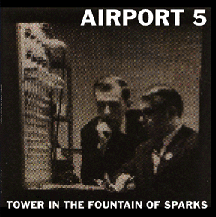Airport 5, Tower in the Fountain of Sparks (Recordhead/Rockathon)
reviewed by Dave heaton
 The first two albums Robert Pollard released this year--Guided by Voices' Isolation Drills and his own Choreographed Man of War--dealt heavily with the darker side of life. Loneliness, confusion, fear, anger were the dominant emotions, with only a glint of hope that things could get better. While both of those releases were exercises in powerful arena rock with a humongous sound, Pollard's newest release Tower in the Fountain of Sparks a collaboration with former GBV member Tobin Sprout in which Sprout contributed all of the music first and Pollard came up with the lyrics and melodies to match. What that means is Tower bears all of the musical marks of Sprout's sound, particularly his guitar-based, mellow melodic style of songwriting (one which bears relations to that of both the Beatles and the New Zealand Flying Nun bands, in contrast with the Who/prog-rock tendencies of Pollard's recent releases).
The first two albums Robert Pollard released this year--Guided by Voices' Isolation Drills and his own Choreographed Man of War--dealt heavily with the darker side of life. Loneliness, confusion, fear, anger were the dominant emotions, with only a glint of hope that things could get better. While both of those releases were exercises in powerful arena rock with a humongous sound, Pollard's newest release Tower in the Fountain of Sparks a collaboration with former GBV member Tobin Sprout in which Sprout contributed all of the music first and Pollard came up with the lyrics and melodies to match. What that means is Tower bears all of the musical marks of Sprout's sound, particularly his guitar-based, mellow melodic style of songwriting (one which bears relations to that of both the Beatles and the New Zealand Flying Nun bands, in contrast with the Who/prog-rock tendencies of Pollard's recent releases).
The musical differences between Airport 5 and the current version of GBV are important, as Tower in the Fountain of Sparks catches Pollard in an altogether more ruminative mood. There's more sadness here than anger, more quiet beauty than rabid energy. The album is just as introspective as Isolation Drills but is both less obvious about it and more peaceful, less agonized. The bulk of the songs on Tower are poetry of the heart: short, melodic pop tunes based on using images to evoke feelings, instead of delivering explicit messages. Pollard's relying on his ability to put together words in a way that captures a mood even when the words themselves make little literal sense.
"Burns Carpenter, Man of Science" opens the album with story about a scientist who contained love in liquid form. "This kind of love will destroy the ozone," Pollard sings in over a catchy but lowkey pop-rock tune that bears a certain resemblance in style to GBV songs of the past. The destructive power of love is a theme here. Men are going "merrily off to war and wedding," and it's hard to tell which is which or which is worse. Yet many of the best songs here are more ambiguous, as open to interpretation as anything Pollard's written before. Some of these, like "Circle of Trim" and "Feathering Clueless (The Exotic Freebird)" have a gorgeous brevity akin to GBV classics like "Jar of Cardinals" or "Non-Absorbing". Others sound like nothing Pollard's done before, but continue to embody a certain undefined longing. "Total Exposure" puts that longing into a wistful ballad about watching children play as the day gives way to night. "Mansfield on the Sky" channels it into a slow, sad waltz which is just as pretty.
While the only real rock single here--the outstanding, enigmatic "Stifled Man Casino"--still relies more heart than power, there are a few tracks where the pondering gives way to anxiety, where the feeling of teetering on the edge of sanity that characterized much of Choreographed Man of War shows its face. What makes Tower slightly difficult to digest at first is the fact that a two of these tracks, "Subatomic Rain" and "One More" appear so early on in the album that it's hard to get a grasp on what the album's mood will be. The shift from "Total Exposure" into Pollard screaming about subatomic rain is hard to take at first. Still, both of those are clearly sides of his music now, and one is no less powerful than the other. The darker songs here have lines that for what some hard-to-define reason are absolutely terrifying, like the way Pollard repeats "we miss you back in Germany" at the end of "Subatomic Rain" and the question he asks on "The Cost of Shipping Cattle": "Did he or did he not use shocking equipment to make you happy?"
The biggest high here is found in the way Sprout and Pollard's distinct musical personalities come together, not only in ways that they haven't since GBV, but in ways that they haven't ever before. GBV's Tonics and Twisted Chasers was the only other time that the two have worked in this manner, or that they have collaborated on a whole album. And while that album is no doubt a classic in its own right, it has little of the emotional depth or musical sophistication of Tower in the Fountain of Sparks. While Tonics had an improvisational feel about it, this album feels complete. It is another album-length journey into the various goings-on of the human heart, filled with mystery, heart and passion.
(www.lunamusic.net)
Copyright (c) 2005 erasing clouds |
|